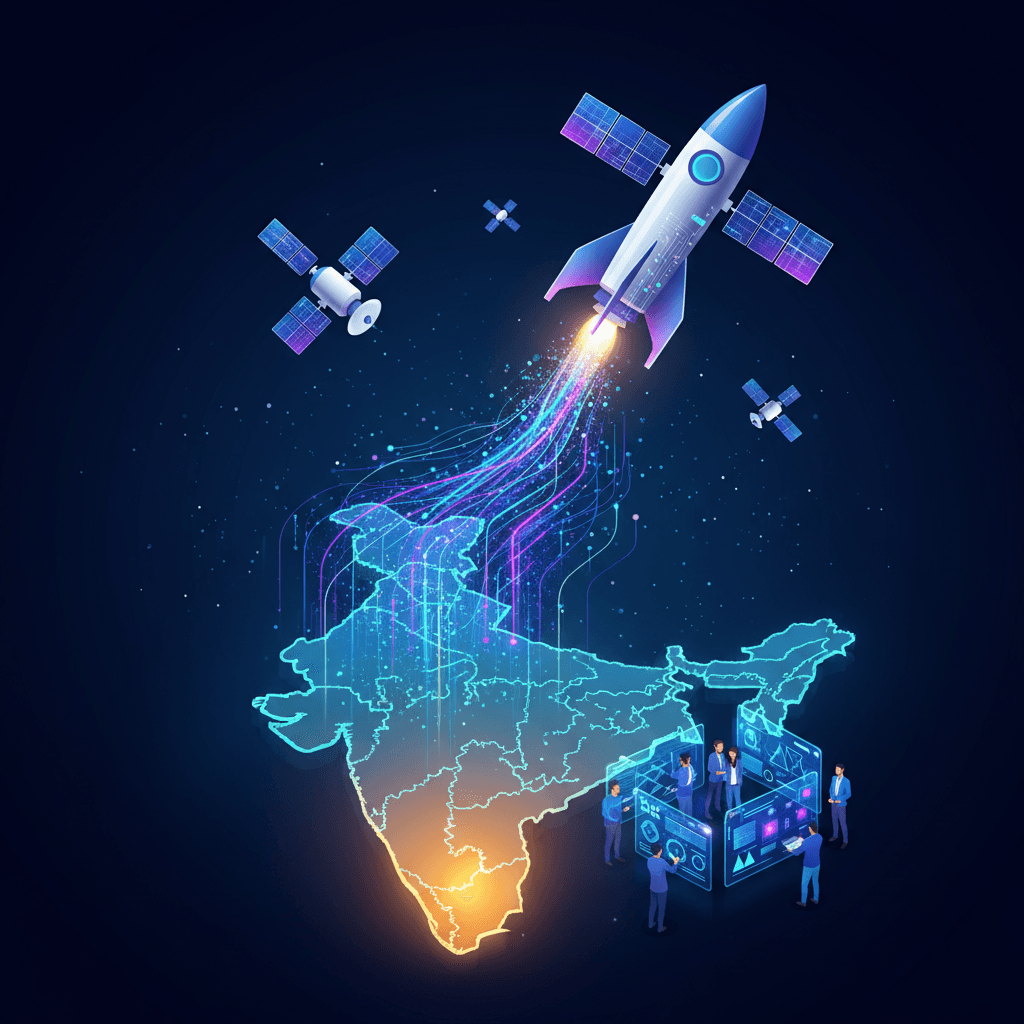Karnataka Harnesses AI to Seize 50% of India's Space Market by 2033
Karnataka’s ambitious plan: leveraging IT and AI leadership to become India’s space economy epicenter by 2033.
November 18, 2025

Karnataka is strategically positioning itself to become the epicenter of India's burgeoning space economy, with an ambitious goal of capturing 50% of the nation's space market by 2033. This move is part of a broader vision to not only dominate the domestic market, projected to be worth $44 billion within the next decade, but also to carve out a significant 5% share of the global space industry.[1][2] At the heart of this strategy is a synergistic approach that leverages the state's well-established dominance in information technology and artificial intelligence to fuel a new era of space exploration and commercialization. The state's aspirations are formalized in the Karnataka Space Technology Policy 2025-2030, a forward-thinking framework designed to attract $3 billion in investments and cultivate a highly skilled workforce.[2]
The cornerstone of Karnataka's ambitious plan is the cultivation of human capital. The policy outlines a comprehensive program to train and upskill 50,000 individuals, with a notable inclusion of 15,000 women, to meet the specialized demands of the global and domestic space sectors.[2] This initiative is designed to create a robust talent pipeline that will serve as the primary driver for the agglomeration of space industries within the state. To further bolster this ecosystem, the government plans to support approximately 500 startups and MSMEs through a variety of financial incentives, including grants, equity funding, and subsidies for intellectual property registration, testing, and quality certification. A key objective is to enable Karnataka-based enterprises to launch over 50 satellites with substantial levels of indigenous technology. The policy's commitment is underscored by a new startup policy with a financial outlay of Rs 518.27 crore, which includes initiatives like 'Elevate NxT' to support DeepTech startups in sectors such as AI and space technology.[3]
The strategic integration of artificial intelligence is a critical differentiator in Karnataka's approach. The state government has concurrently approved the Karnataka Information Technology Policy 2025–2030, signaling a clear intent to create an "AI-native" state where artificial intelligence is deeply embedded across industry and public services.[4] This dual-policy approach aims to seamlessly merge the state's formidable IT sector with its growing space-tech ambitions. Initiatives under these policies include the establishment of Centres of Excellence for AI and Computing, which are expected to become hubs for research, development, and innovation. Speaking on the integration, ISRO Chairman S. Somanath highlighted the importance of combining high-tech strengths with the IT prowess of Bangalore to create effective tech-delivery platforms. He has noted that AI is actively being integrated into ISRO's operations, from analyzing vast datasets collected from missions to embedding AI directly into satellites and rockets for autonomous, data-driven decisions.[5]
This vision is already taking root in Bengaluru's vibrant startup ecosystem, which is home to the highest percentage of space-tech startups in India. Companies are increasingly leveraging AI to offer innovative solutions. For instance, some startups are building high-resolution hyperspectral imaging satellite constellations that use AI-powered insights to address climate issues in real time. Others are using satellite data and machine learning to provide "decision intelligence" to sectors like agriculture and finance. The application of AI extends to revolutionizing computer vision, communication, and motion control for satellites and launch vehicle subsystems. The convergence of AI and space technology is not merely a concept but a commercial reality in Karnataka, with local startups attracting significant funding for their AI-driven space solutions. An interview with Yashas Karanam, co-founder of Bengaluru-based Bellatrix Aerospace, revealed that his company has a dedicated 'AI for space' team working on future applications like in-orbit servicing and refueling, underscoring the industry's forward momentum.[6]
Despite the clear vision and robust framework, the path to dominating the space sector is not without its challenges. The space industry is highly engineering-intensive, demanding a niche talent pool with specialized expertise that must be carefully nurtured.[7] Furthermore, the application of AI in the harsh environment of space presents its own set of technical hurdles, including the need for radiation-hardened hardware and robust algorithms that can function with limited computational power.[8] There are also significant cybersecurity threats and potential supply chain vulnerabilities to consider as the sector grows.[9][10] From a financial perspective, while government support is proactive, space-tech ventures often face a more challenging funding landscape compared to pure-play software and AI startups, which can impact scalability and business development.[7]
In conclusion, Karnataka's bold strategy to capture half of India's space market by 2033 is a calculated and well-supported endeavor. By intertwining its space ambitions with its established leadership in IT and AI, the state is creating a unique and powerful ecosystem for innovation. The comprehensive Space Technology Policy, with its focus on skill development, startup incubation, and infrastructure, provides a clear roadmap for achieving its goals. The enthusiastic support from national institutions like ISRO, coupled with the dynamism of its homegrown startups, positions Karnataka as a formidable contender in the global space race. While significant challenges related to talent, technology, and funding persist, the state's integrated and forward-looking approach provides a strong foundation for transforming its ambitious vision into a reality, potentially reshaping not only its own economy but also India's stature in the final frontier.